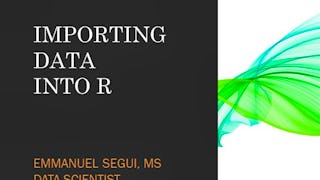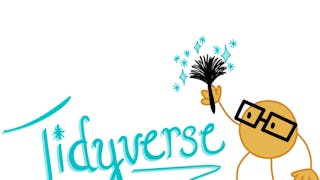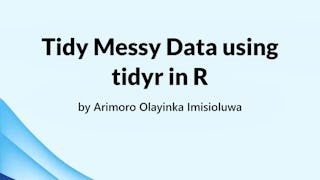This course aims to better develop your statistical toolkit in the world of statistics and data science. You will learn how to collect, manipulate, and transform data in R into a more readily usable format using tidyverse data pipelines, primarily using verbs from the dplyr and tidyr packages. The topics covered provide you with the tools necessary to convert data to be better suited for data visualization (Course 1) and modeling; which is to come in this certificate program in a future course. Additionally, we discuss the topics of web scraping and the considerations one must take prior to scraping data from the web.



Data Tidying and Importing with R
Dieser Kurs ist Teil von Spezialisierung Data Science with R


Dozenten: Dr. Elijah Meyer
Bei  enthalten
enthalten
Was Sie lernen werden
Apply tidy data principles to manipulate and restructure data (e.g., subsetting, adding columns, and transforming data between wide and long formats)
Develop and implement code to join data sets and perform basic web scraping to collect data
Apply data structures such as wide and long formats, using code to convert between these formats as part of data preparation and analysis
Wichtige Details

Zu Ihrem LinkedIn-Profil hinzufügen
3 Aufgaben
Erfahren Sie, wie Mitarbeiter führender Unternehmen gefragte Kompetenzen erwerben.

Erweitern Sie Ihre Fachkenntnisse
- Lernen Sie neue Konzepte von Branchenexperten
- Gewinnen Sie ein Grundverständnis bestimmter Themen oder Tools
- Erwerben Sie berufsrelevante Kompetenzen durch praktische Projekte
- Erwerben Sie ein Berufszertifikat zur Vorlage


Erwerben Sie ein Karrierezertifikat.
Fügen Sie diese Qualifikation zur Ihrem LinkedIn-Profil oder Ihrem Lebenslauf hinzu.
Teilen Sie es in den sozialen Medien und in Ihrer Leistungsbeurteilung.

In diesem Kurs gibt es 3 Module
Tidy datasets have a specific structure: each variable is a column, and each observation is a row. In this module, we use functional verbs from the dplyr package in R to transform data into a ready-to-use tidy data format. Additionally, we use functional verbs to manipulate data frames.
Das ist alles enthalten
6 Videos11 Lektüren1 Aufgabe2 Diskussionsthemen1 Plug-in
A column in our data set can be stored as many different types, such as numbers or characters. These different data types inform how R treats the data, and whether certain functions are compatible to use with certain types of data. In this module, we discuss more in detail, the different data types classified by R, data classes, as well as how to recode variables in a data set to be different types, classes, or take on different values.
Das ist alles enthalten
6 Videos13 Lektüren1 Aufgabe1 Diskussionsthema1 Plug-in
Web scraping is the process of extracting this information automatically and transforming it into a structured dataset. In this module, we go over how to perform basic web scraping in R to make an abundance of data online more easily accessible.
Das ist alles enthalten
4 Videos5 Lektüren1 Aufgabe2 Diskussionsthemen1 Plug-in
Dozenten

Mehr von Data Analysis entdecken


Johns Hopkins University


Coursera Project Network


Johns Hopkins University


Coursera Project Network
Warum entscheiden sich Menschen für Coursera für ihre Karriere?





Neue Karrieremöglichkeiten mit Coursera Plus
Unbegrenzter Zugang zu 10,000+ Weltklasse-Kursen, praktischen Projekten und berufsqualifizierenden Zertifikatsprogrammen - alles in Ihrem Abonnement enthalten
Bringen Sie Ihre Karriere mit einem Online-Abschluss voran.
Erwerben Sie einen Abschluss von erstklassigen Universitäten – 100 % online
Schließen Sie sich mehr als 3.400 Unternehmen in aller Welt an, die sich für Coursera for Business entschieden haben.
Schulen Sie Ihre Mitarbeiter*innen, um sich in der digitalen Wirtschaft zu behaupten.
Häufig gestellte Fragen
Access to lectures and assignments depends on your type of enrollment. If you take a course in audit mode, you will be able to see most course materials for free. To access graded assignments and to earn a Certificate, you will need to purchase the Certificate experience, during or after your audit. If you don't see the audit option:
The course may not offer an audit option. You can try a Free Trial instead, or apply for Financial Aid.
The course may offer 'Full Course, No Certificate' instead. This option lets you see all course materials, submit required assessments, and get a final grade. This also means that you will not be able to purchase a Certificate experience.
When you enroll in the course, you get access to all of the courses in the Specialization, and you earn a certificate when you complete the work. Your electronic Certificate will be added to your Accomplishments page - from there, you can print your Certificate or add it to your LinkedIn profile. If you only want to read and view the course content, you can audit the course for free.
If you subscribed, you get a 7-day free trial during which you can cancel at no penalty. After that, we don’t give refunds, but you can cancel your subscription at any time. See our full refund policy.
Weitere Fragen
Finanzielle Unterstützung verfügbar,

